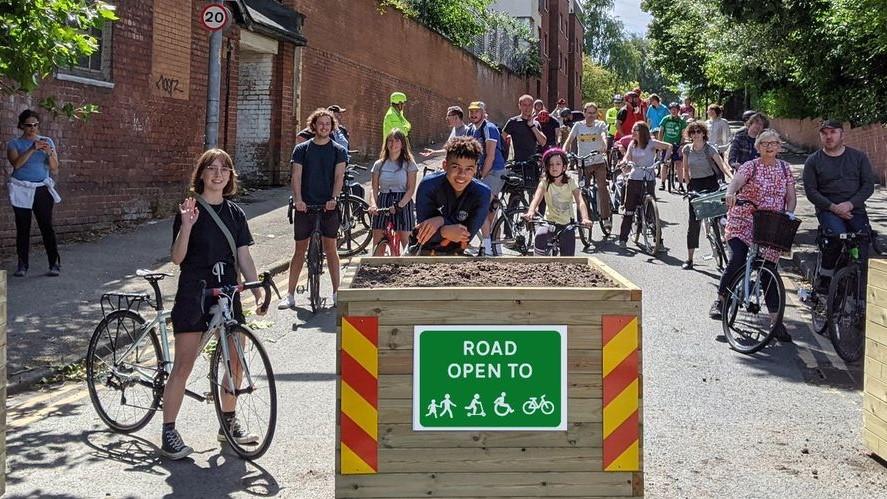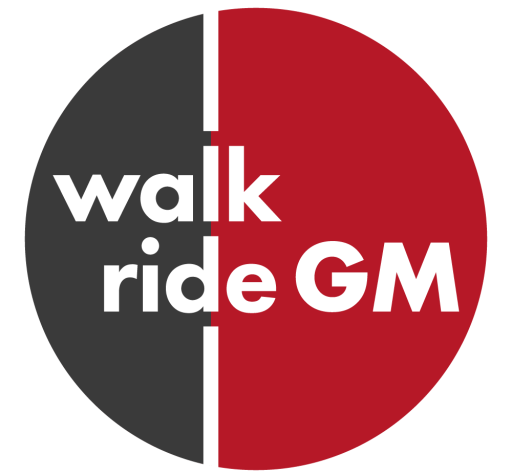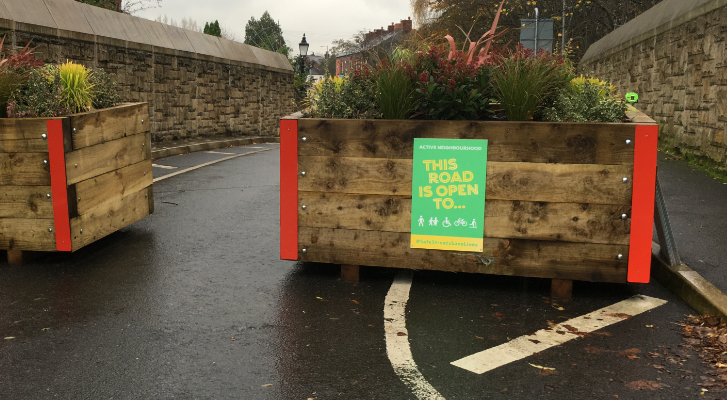Words are important – particularly when trying to win hearts and minds. Many people regularly tell surveys they want healthier, safer movement through our streets, but sometimes encouraging those steps in reality requires the right choice of words that both demonstrate the universal benefits that can be possible and counter the bad faith arguments from naysayers. Here are a few of the linguistic approaches we’ve picked up from kindred campaigns…
Cyclists vs people on bikes
For whatever reason (take your pick from automobile lobbying to media click bait articles), in the UK context the word ‘cyclist’ conjures the imagery of a Belleville Rendezvous caricature of a MAMIL (Middle Aged Man In Lycra) that all too often provokes an ‘us and them’ mentality among otherwise rational people.
In Seattle, a pro-low-traffic neighbourhoods community group decided to take Portland, OR’s ‘neighbourhood greenways’ political rebranding exercise a step further, by peddling more people-friendly terms to regain the humanity of cycling. So, cyclists became ‘people on bikes’; similarly, drivers became ‘people driving’.
Accident vs crash
As tragically shown on our page, road traffic incidents continue to endanger people using active travel modes on our roads. There is a strong argument to say the fact that an average of 5 people every day are killed in collisions involving motor cars means we need radical change in our road culture, not least how they are managed and policed. Some police forces are better than others, and work is being done to bring police forces up to best practice standards – and this includes how these incidents are described by the police and media.
The party line is that they don’t want to prejudice any potential trial by adding emotive language. But there has to be a solution that doesn’t remove the agency from reporting, and instead helps to show these incidents for what they are: unacceptable.
The victim support charity Road Peace explains this well and has a ongoing campaign calling on the media and authorities to stop using the word ‘accident’, using its #crashnotaccident hashtag on social media.
Even the American Automobile Association has acknowledged that ‘crash’ should be used in place of ‘accident’, saying that crashes are drivers’ responsibility and not something that ‘just happens’.
So when will we see this implemented across our media and authorities?
Obesity vs inactivity
With almost daily mention being made of the “obesity epidemic” by one or another media outlet and/or politician, what better bandwagon for us active travel campaigners to jump on, right? Actually, wrong – for a number of reasons.
First, the categories of ‘normal weight’, ‘overweight’, ‘obese’ are based on a person’s BMI score, a crude measurement of no more than someone’s height-to-weight ratio that says very little about their general state of health or activity levels.
Second, even if BMI were an accurate measure of someone’s overall health (reminder: it isn’t), it is a divisive and discriminatory concept in the context of active travel advocacy. It risks our message being divided into: “thin people should travel actively because it’s fun, quick, green, and saves money. Non-thin people should travel actively because they need to get thin!” There are so many universal, inclusive benefits to active travel that we don’t need to join the cacophony of unkind voices telling folk in the higher BMI range that their bodies are wrong and we know how to fix them.
But third, even if it were the role of active travel advocacy to police people’s body shapes and sizes (reminder: it absolutely isn’t), what we advocate – in essence, replacing short car journeys with walking or cycling trips – is unlikely to move someone from the ‘overweight’ or ‘obese’ BMI range into the ‘normal’ range without additional, far-reaching lifestyle interventions that go way beyond the changes to urban infrastructure we campaign for.
And thus, it is not only more humane, it is also more accurate to talk about active travel as a means of tackling ‘inactivity’ as opposed to ‘obesity’. Embracing active travel may well not make you thin, but it will make you more active. And being more active is something we can positively advocate across all strata of society, irrespective of age, social background, and body shape. This blog post is a good starting point for a more detailed exploration of the manifold issues around this topic.
Road closures vs open streets
As we begin to see more and more active neighbourhoods across Greater Manchester, the access permissions of different transport modes to and through our streets are being changed. The default term for the modal filters, such as bollards or planters, that are used to transform rat runs into access-only streets is often ‘road closures’, or similar.
But the streets are open to everyone; even people using a vehicle. The difference is that through routes are only open to people using active, non-vehicular modes. Signage has been created by campaigners to reflect this (see below), and we can help to keep emphasising that streets are more open to people, including those who were previously disabled by the living environment.

Active travel vs ???
How should we describe the phenomenon for which we’re campaigning? ‘Active travel’ has attained default among those savvy with the lingo, in part because saying ‘walking and cycling’ doesn’t tick all the boxes (e.g. scooting, roller-skating, wheelchairing) and adding all the other specific modes into the phrase would be a bit of a mouthful. If you have any ideas, then please add them to the comments, below…
Words by Ian Pennington and Nick Hubble.

